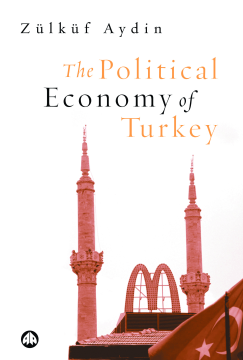
Additional Information
Book Details
Abstract
Since the 1970s, Turkey has faced some of the most serious crises since the Republic was established in 1923. This book analyses the political and socio-economic problems faced by Turkey in recent decades and the country's gradual integration into the global economy.
Social unrest, political and ethnic violence, paralysis of the state bureaucracy and other institutions, increasing foreign debt, decreasing economic growth, vast inflation and increasing unemployment have all been part of everyday life in Turkey's recent history. Zulkuf Aydin argues that this state of affairs is symptomatic of a deeper, more enduring crisis arising from the way in which Turkey has been integrated into the global economy. Looking at democracy, repression, the military, the Kurdish question and regional inequalities, civil society, human rights and Islamic fundamentalism in Turkey, he shows how Turkey has become reliant on foreign investment and international financial institutions, offering a broader critique of globalisation in this light.
Table of Contents
| Section Title | Page | Action | Price |
|---|---|---|---|
| Contents | v | ||
| Introduction | 1 | ||
| Interpretations of globalisation | 2 | ||
| Globalisation, homogenisation and global inequalities | 4 | ||
| Periodic crises and capitalism | 5 | ||
| Globalisation and TNCs | 8 | ||
| Globalisation, internationalisation of capital and the nation state | 9 | ||
| The 1980s and debt peonage | 11 | ||
| Speculative capital movements | 13 | ||
| Flow of equity investment to emerging markets | 15 | ||
| The USA's role in the current financial crises | 17 | ||
| Globalisation again | 21 | ||
| 1 The state | 25 | ||
| Introduction | 25 | ||
| State intervention in Turkey | 26 | ||
| Economic policies in the 1950s | 31 | ||
| The planned period 1960-80 | 34 | ||
| Development since 1980 | 43 | ||
| How successful were the SAPs in the 1980s? | 48 | ||
| Liberalisation of foreign trade | 51 | ||
| Repressive anti- trade union policies | 52 | ||
| 2 Democracy, development and good governance | 57 | ||
| Good governance, democracy and development | 58 | ||
| Democracy and development | 66 | ||
| The predominance of the state | 78 | ||
| The Turkish State | 83 | ||
| Democracy in Turkey | 96 | ||
| Liberalisation and democratisation since 1980 | 100 | ||
| 3 Cyclical crises since 1980 | 105 | ||
| Rapid loss of economic autonomy | 110 | ||
| Financial liberalisation and the 1994 crisis | 114 | ||
| Disinflation programmes and the 2000-01 crisis | 119 | ||
| Repercussions of the 2001 crisis | 123 | ||
| The transition to a stronger Turkish economy programme of 2001 | 125 | ||
| Conclusion | 134 | ||
| 4 Agrarian crisis | 138 | ||
| Internationalisation of Third World agriculture | 140 | ||
| The end of developmentalism | 142 | ||
| General Agreement on Trade and Tariffs ( GATT) and the World Trade Organisation ( WTO) | 147 | ||
| The promotion of small- scale household production and the modernisation of Turkish agriculture | 153 | ||
| Economic hardships and neo- liberalism | 155 | ||
| Standby agreements since 1999 and Turkish agriculture | 159 | ||
| The sagas of sugar and tobacco | 165 | ||
| Sugar | 165 | ||
| Tobacco | 166 | ||
| Direct income support | 168 | ||
| Liberalisation and food security | 171 | ||
| History repeats itself: Mexico and Turkey | 174 | ||
| 5 Political Islam in Turkey | 179 | ||
| Political Islam as a reaction to modernisation | 180 | ||
| Kemalism, Islam and identity politics | 183 | ||
| Turkish identity and Islam | 184 | ||
| The moderation of political Islam | 196 | ||
| Political Islam, class politics and business interests | 198 | ||
| The National Outlook Movement ( NOM) | 200 | ||
| The rise and fall of the Welfare Party | 202 | ||
| Globalisation and the rise of political Islam in Turkey | 208 | ||
| Conclusion | 217 | ||
| 6 The Kurdish question | 222 | ||
| Ethnicity and identity | 227 | ||
| The emergence of conflicting Turkish and Kurdish ethnies | 230 | ||
| Treaties of SËvres and Lausanne | 234 | ||
| The emergence of Kurdish nationalism in Turkey | 234 | ||
| Kurdish nationalist discourse in Turkey | 239 | ||
| Uncompromising nationalism | 241 | ||
| Conclusion: the European Union and the Kurdish question | 243 | ||
| 7 Conclusion | 245 | ||
| Notes | 261 | ||
| Bibliography | 266 | ||
| Index | 287 |
